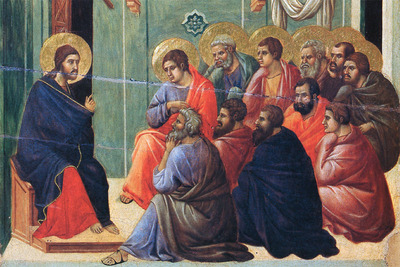Second Sunday of Easter
Sunday of Divine Mercy
April 7, 2024 — Year B
Readings: Acts 4:32-35 / Ps 118 / 1 Jn 5:1-6 / Jn 20:19-31
by Rev. Jay Biber, Guest Celebrant
Ancient baptismal fonts would be octagons in shape. You’d walk in one side with moving water, a river flowing through, built separate from the church. You’d be received, and you’d have your old crummy clothes on, and those would be taken. Those would be left behind, and you’d walk through the water, you’d be baptized in the water, and then you’d be given all new garments. You’d be a new creation, a new person. And you’d walk out a different door than the one you came in, on a different side. You can see that still on the coast of France, the ancient churches from the fourth and fifth centuries, where you still see the octagonal baptismal font.
The whole idea of the octagon is that you have the week as seven days, but the eighth is the first day of the new creation. If you’re in France, they don’t say “I’ll see you in a week;” they say “On se voit dans huit jours,” we’ll see each other in eight days. That notion of the octave makes its way into the ordinary daily language.
Pope John Paul II and St. Faustina Kowalska had a vision of the glorified Christ; that’s what is described here, the glorified Christ. This is not the same as being resuscitated, as when a person “dies” during an operation and is brought back. In that situation, the person who comes back is the same one as the one who left, as in the case of Lazarus. Christ was able to resuscitate, to revive Lazarus, even though he was clearly dead for four days.
But the Resurrection is what we pray for when we say, “I believe in the resurrection of the body” in the Apostles’ Creed. Our bodies are so important that Christ took on a body in the Incarnation. We look forward to that Resurrection in our glorified body. The glorified body, what will it look like? Will it be an old one or a young one? God brought us into being from nothing, that’s how important our bodies are. That’s where a lot of our moral code comes from, the significance of the human body. And so, do you want your body to be a playground or a temple?
This great week of Easter is largely a story of mercy. St. Faustina Kowalska developed the Divine Mercy devotion. And for those of you not familiar with it, it’s a devotion that’s prayed on your rosary. Just like you pray your rosary, you work the same beads. You do the same beads with different prayers, and super focused on the Passion, the suffering that Christ went through for us.
What does mercy look like? The community of believers was of one heart and mind. No one claimed that any of his possessions were his. Think of it like this, if you eliminated the word “mine” from your vocabulary. They had everything in common, no needy person among them. Those who had property or houses would sell them and put the proceeds at the feet of the apostles, and they would distribute them to each according to need.
Now this is not the same as Das Kapital by Karl Marx; this is not some communistic thing at all, because it’s not taking the aristocracy and eliminating it and replacing it with the state with a lot of force. No, I think this is that, from having experienced mercy, having known what mercy was like, what mercy does to set us free. We have the instinct to protect and mark our territory; that’s evolutionary, that makes sense. There’s also that other competing instinct within us to go outside of ourselves.
I sensed it in that early community that when mercy has touched you, fear leaves you. And the stuff that you can’t do when you’re afraid, you can now do, when you not only believe in God, but when you can say with St. Faustina, “Jesus, I trust in you,” and entrust Him with the details of your life.
Can you imagine if you place yourself in that upper room? You’re one of the apostles who have made all the promises to Jesus, and the last He saw of you was your back. Peter, of course, collapsed once he heard the cock crow, for that exposed him, exposed all the shame of having dropped the ball in the one great moment that he had. Judas sold him out. The others had fled, and here they are gathered in fear when the Resurrected One joins them. Walks through the locked door. And what does He say now?
If I had like eleven friends abandon me like that, I’m thinking I might have some salty language for them. But no, Christ says, “Peace be with you,” of all things. And then it says the disciples rejoiced. We can rejoice in the gift that Thomas the doubting one, a scant twenty years after his own moment of doubt, brought his faith to India and proudly died a martyr, as did eleven of the twelve apostles, pouring out their blood joyfully for the sake of being able to bring the scriptures.
Can we really believe that God is that merciful? Are there chances that you can show mercy? I suspect that you will begin to feel that freedom and deep joy, because now you’re beginning to see through the eyes of Christ.
 540-586-8988
540-586-8988 

